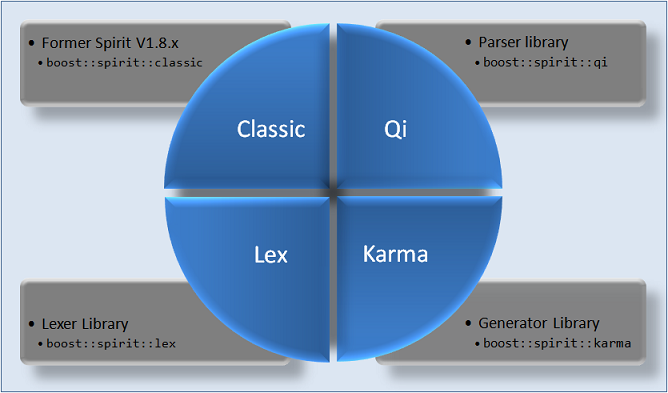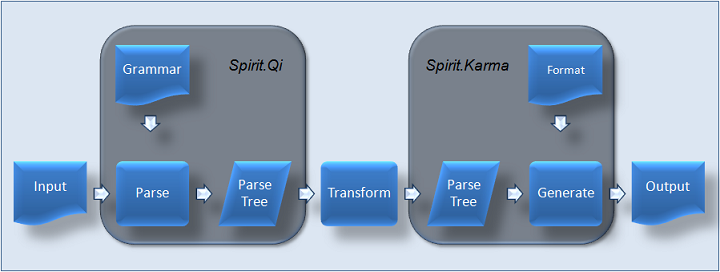应用场景
许多后端检索server启动时候需要从文件加载到内存中构建索引,这个过程往往会消耗比较多的时间,这样会造成sever启动消耗比较多的时间,在存在多台服务器的时候会更加明显。
我们可以将够构建索引的过程独立成一个单独的进程,此进程实现的功能是根据原始文件构建索引结构,并将索引结构序列化到本地二进制文件,Server在启动的时候只需要读取二进制文件就可以构造出索引结构,可以大大提高启动速度。
示例代码
io.hpp ,对std::ifstream 以及std::ofstream 的封装,提供从vector序列化到二进制文件和从二进制文件反序列化到vector等接口1
2
3
4
5
6
7
8
9
10
11
12
13
14
15
16
17
18
19
20
21
22
23
24
25
26
27
28
29
30
31
32
33
34
35
36
37
38
39
40
41
42
43
44
45
46
47
48
49
50
51
52
53
54
55
56
57
58
59
60
61
62
63
64
65
66
67
68
69
70
71
72
73
74
75
76
77
78
79
80
81
82
83
84
85
86
87
88
89
90
91
92
93
94
95
96
97
98
99
100
101
102
103
104
105
106
107
108
109
110
111
112
113
114
115
116
117
118
119
120
121
122
class FileReader
{
public:
FileReader(const std::string& filename)
: input_stream(filename,std::ios::binary)
{
}
/* Read count objects of type T into pointer dest */
template <typename T> void ReadInto(T *dest, const std::size_t count)
{
static_assert(std::is_trivially_copyable<T>::value,
"bytewise reading requires trivially copyable type");
if (count == 0)
return;
const auto &result = input_stream.read(reinterpret_cast<char *>(dest), count * sizeof(T));
const std::size_t bytes_read = input_stream.gcount();
if (bytes_read != count * sizeof(T) && !result)
{
return;
}
}
template <typename T> void ReadInto(std::vector<T> &target)
{
ReadInto(target.data(), target.size());
}
template <typename T> void ReadInto(T &target)
{
ReadInto(&target, 1);
}
template <typename T> T ReadOne()
{
T tmp;
ReadInto(tmp);
return tmp;
}
std::uint32_t ReadElementCount32()
{
return ReadOne<std::uint32_t>();
}
std::uint64_t ReadElementCount64()
{
return ReadOne<std::uint64_t>();
}
template <typename T> void DeserializeVector(std::vector<T> &data)
{
const auto count = ReadElementCount64();
data.resize(count);
ReadInto(data.data(), count);
}
private:
std::ifstream input_stream;
};
class FileWriter
{
public:
FileWriter(const std::string& filename)
: output_stream(filename,std::ios::binary)
{
}
/* Write count objects of type T from pointer src to output stream */
template <typename T> void WriteFrom(const T *src, const std::size_t count)
{
static_assert(std::is_trivially_copyable<T>::value,
"bytewise writing requires trivially copyable type");
if (count == 0)
return;
const auto &result =
output_stream.write(reinterpret_cast<const char *>(src), count * sizeof(T));
}
template <typename T> void WriteFrom(const T &target)
{
WriteFrom(&target, 1);
}
template <typename T> void WriteOne(const T tmp)
{
WriteFrom(tmp);
}
void WriteElementCount32(const std::uint32_t count)
{
WriteOne<std::uint32_t>(count);
}
void WriteElementCount64(const std::uint64_t count)
{
WriteOne<std::uint64_t>(count);
}
template <typename T> void SerializeVector(const std::vector<T> &data)
{
const auto count = data.size();
WriteElementCount64(count);
return WriteFrom(data.data(), count);
}
private:
std::ofstream output_stream;
};
binary_io.cpp1
2
3
4
5
6
7
8
9
10
11
12
13
14
15
16
17
18
19
20
21
22
23
24
25
26
27
28
29
30
31
32
33
34
35
36
37
38
39
40
41
42
43
44
45
46
47
48
49
50
51
52
struct Data
{
int a;
double b;
friend std::ostream& operator<<(std::ostream& out,const Data& data)
{
out << data.a << "," << data.b;
return out;
}
};
template<typename T>
void printData(const std::vector<T>& data_vec)
{
for (const auto data : data_vec)
{
std::cout << "{" << data << "} ";
}
std::cout << std::endl;
}
template<typename T>
void serializeVector(const std::string& filename,const std::vector<T>& data_vec)
{
FileWriter file_writer(filename);
file_writer.SerializeVector<T>(data_vec);
}
template<typename T>
void deserializeVector(const std::string& filename,std::vector<T>& data_vec)
{
FileReader file_reader(filename);
file_reader.DeserializeVector<T>(data_vec);
}
int main()
{
std::vector<Data> vec1 = {{1,1.1},{2,2.2},{3,3.3},{4,4.4}};
std::cout << "before write to binary file.\n";
printData(vec1);
const std::string filename = "vector_data";
std::cout << "serialize vector to binary file.\n";
serializeVector<Data>(filename,vec1);
std::vector<Data> vec2;
deserializeVector<Data>(filename,vec2);
std::cout << "vector read from binary file.\n";
printData(vec2);
return 0;
}
编译代码1
g++ -std=c++11 binary_io.cpp -o binary_io
执行程序1
./binary_io
执行结果
程序将内存中vector 数据写入二进制文件,并从二进制文件中反序列化到一个新的vector。可以看到序列化前和序列化后的结果一致。
注意
序列化到文件的数据结构需要满足 is_trivially_copyable。std::is_trivially_copyable 在c++11 引入,TriviallyCopyable类型对象有以下性质
每个拷贝构造函数是trivial 或者是deleted
每个移动构造函数是trivial 或者是deleted
每个拷贝赋值运算符是trivial 或者是deleted
每个移动赋值运算符是trivial 或者是deleted
以上至少有一个是non-deleted
析构函数是trivial 并且non-deleted
对于is_trivially_copyable 类型对象的性质,解释如下
Objects of trivially-copyable types are the only C++ objects that may be safely copied with std::memcpy or serialized to/from binary files with std::ofstream::write()/std::ifstream::read(). In general, a trivially copyable type is any type for which the underlying bytes can be copied to an array of char or unsigned char and into a new object of the same type, and the resulting object would have the same value as the original
只有满足trivially-copyable的对象才可以保证序列化到二进制文件后, 从二进制文件反序列化到内存后的值保持不变。


